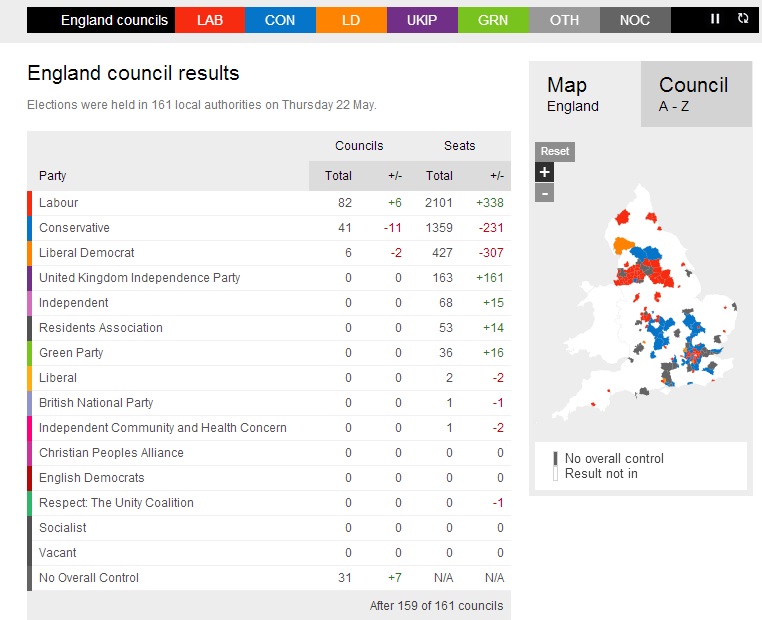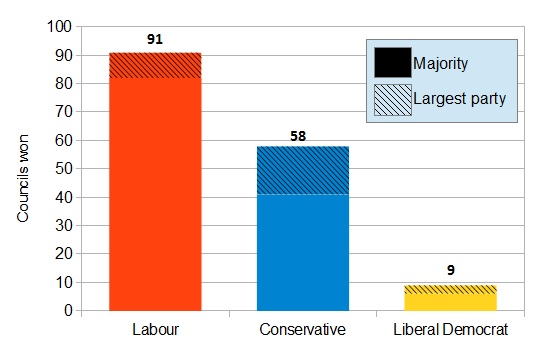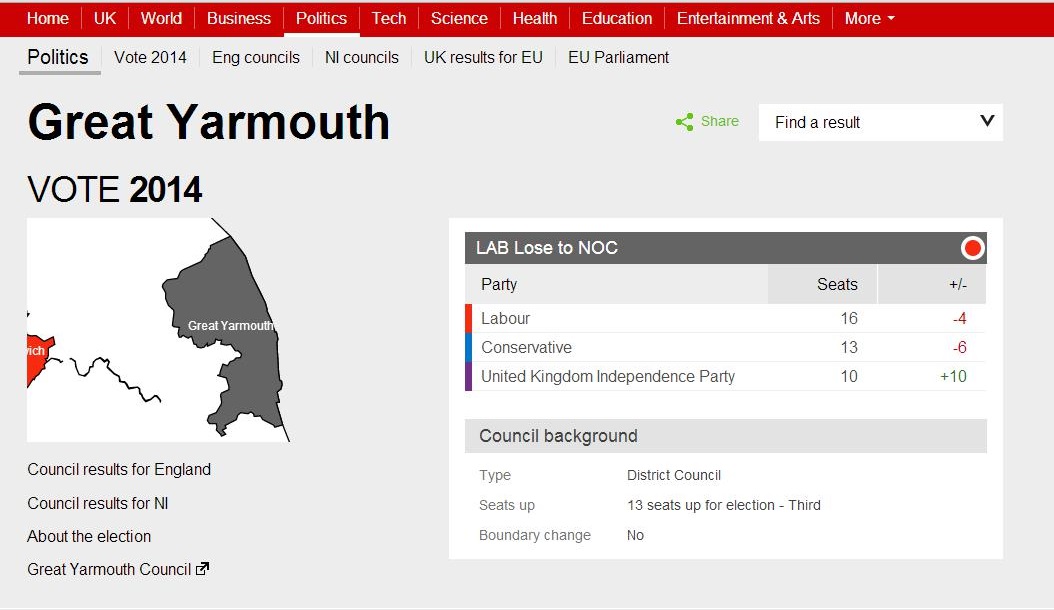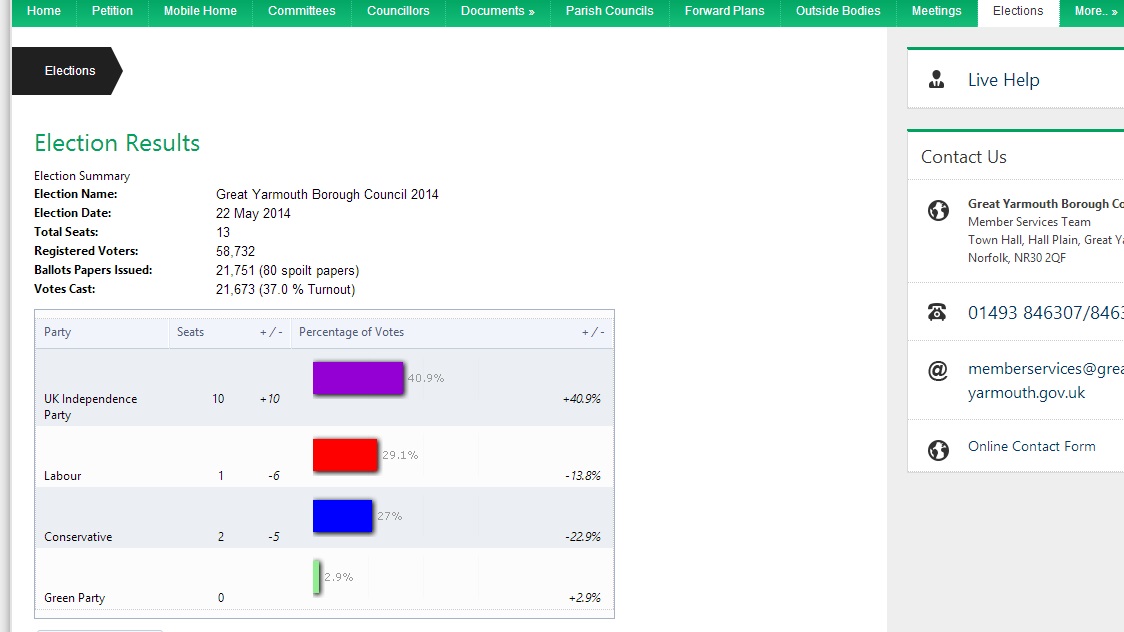The use of the misleading ‘No Overall Control’ designation means some voters still don’t know who won their local election
Elections took place in 172 English and Northern Irish local authorities last week, alongside the European Parliament election. For most councils there was a decisive result, with a single majority party emerging. But there were dozens of councils where no party won a majority, and were therefore designated as ‘No Overall Control’. Democratic Audit’s Richard Berry believes both the media and councils fail to provide adequate information to voters about the results of these elections. In this post he sets out how practices can be improved to give voters a clearer picture of what happened in their area.
As the results of the local elections rolled in on Thursday night and Friday, millions of voters across England and Northern Ireland will have been waiting to hear about the outcome in their area. But for a significant minority, the closest they got to an announcement of the result was being told that their council was officially under ‘No Overall Control’ (NOC).
This is how the BBC reported the overall national result, with NOC ‘winning’ the third greatest number of councils after Labour and the Conservatives:
All other national media outlets we checked repeated the same practice, including Sky, The Guardian and The Telegraph. The NOC designation itself is misleading: what is really meant is that no single party has a majority of council seats. This does not mean, of course, that nobody controls the council; a leader and cabinet will still be elected to form the ruling administration, either from the largest party governing alone or in coalition with one or more other parties.
It would be more accurate, therefore, to dispense with the NOC designation. The total number of councils won by each party should include the councils where they are the largest party, even if they do not have a majority. Democratic Audit published a running breakdown of NOC councils as results were being announced last week, noting how many had been ‘won’ by each party. This data gives us a revised national result for England, which looks like this:
This puts a new perspective on the overall national result. While Labour won twice as many councils outright as the Conservatives last week, when we include the NOCs we see that, in reality, they won just over a third more councils. Meanwhile, the performance of the Liberal Democrats is improved by 50% when we include the NOCs.
Of course, voters looking for their own council can find a more detailed summary, which shows them how many seats each party has locally. However, these summaries often fail to provide any more clarity about who has won the election. If there is a single party with significantly more seats than all others, it may be relatively clear that party will go on to lead the administration. But where parties are more evenly matched, voters are left with no clue about who is in power.
For instance, look at the BBC summary of the election for Great Yarmouth Borough Council, one of those where UKIP performed particularly well:
With this new composition, there are three viable coalitions, plus the possibility Labour may run a minority administration. This summary does not reveal what the final outcome is. Although it might be pointed out, rightly, that Great Yarmouth councillors have not yet reached any agreements on who will rule, it is also the case that the BBC will not return to update this summary once they have.
It is worth remembering that the House of Commons itself is NOC, according to the media’s definition. Strangely, we never use that term for Westminster elections, preferring the similarly vague ‘hung parliament’. Imagine if the BBC had failed to report after the 2010 election that the Conservatives and Liberal Democrats had formed a coalition government? It’s inconceivable, but that is effectively what they and all national media outlets do after local elections for NOC councils.
Councils themselves can and should take steps to rectify this deficit of information. Disappointingly, many do not. Staying with Great Yarmouth, we checked how the results had been reported on the council website. There is no item about the election results on the council homepage, and no press release has been issued. Clicking through to the ‘Elections’ page on the website, visitors will eventually be presented with the following summary result:
This summary only tells voters about the results of the seats that have just been elected, and does not show the new composition of the council. Voters would be forgiven, therefore, for thinking UKIP won the election. In a narrow sense this might be true, but the bigger picture is that UKIP is in fact the smallest party on the council. The outcome that matters most – knowing which party will provide the Leader of the Council – would be even murkier for voters after checking this summary.
Both the media and councils need to consider changing the way they inform voters about local elections results:
- Councils need to make swifter announcements about which party or parties are forming the ruling administration. In previous Democratic Audit research, we noted that the London Borough of Merton did not announce that Labour was forming a minority administration until three weeks after the 2010 local election. Even if decisions cannot be made instantaneously, any announcement of the election results should be accompanied by a description for the process and timeline for how the new administration will be formed.
- Media outlets should stop using the term ‘No Overall Control’. If anything, ‘No Majority’ would be more accurate. But it would be more helpful for voters if the media is clear about which is the largest party on councils where there is no majority, and include this in their summary results.
- Both councils and the media need to return to their election results pages once further announcements have been made, to update them with the information about which parties went on to form the administration.
—
Note: This post represents the views of the author, and does not give the position of Democratic Audit or LSE. Please read our comments policy before responding. Shortlink for this post: buff.ly/1jS7CAE
—
 Richard Berry is managing editor and researcher at Democratic Audit. His background is in public policy and political research, particularly in relation to local government. In previous roles Richard has worked for the London Assembly, JMC Partners and Ann Coffey MP. He is the author of the book Independent: The Rise of the Non-Aligned Politician (Imprint Academic, 2008). He tweets at @richard3berry.
Richard Berry is managing editor and researcher at Democratic Audit. His background is in public policy and political research, particularly in relation to local government. In previous roles Richard has worked for the London Assembly, JMC Partners and Ann Coffey MP. He is the author of the book Independent: The Rise of the Non-Aligned Politician (Imprint Academic, 2008). He tweets at @richard3berry.









 Democratic Audit's core funding is provided by the Joseph Rowntree Charitable Trust. Additional funding is provided by the London School of Economics.
Democratic Audit's core funding is provided by the Joseph Rowntree Charitable Trust. Additional funding is provided by the London School of Economics.
Does use of the term “no overall control” mislead voters as to who runs their Council? https://t.co/C8XBSoVbcd
RT @PJDunleavy: Media using a misleading ‘No Overall Control’ label means many voters STILL don’t know who won their local election https://…
Good piece by @richard3berry on why the use of NOC to describe council results is misleading – https://t.co/xCHhbJnE1N
The use of the misleading ‘No Overall Control’ designation means some still don’t know who won their local election https://t.co/f8fyNy9P8A
Here are the real results of the local elections: Lab 91 councils, Con 38, Lib 9. More info: https://t.co/jsBigexfNd https://t.co/abDvwsalKy
RT @richard3berry: Why the media’s use of ‘No Overall Control’ to describe a council election result is inaccurate and misleads voters http…
@networknicola Thanks Nicola, we wrote up findings & concerns in more detail here: https://t.co/0Shls3yshc
The use of the misleading ‘No Overall Control’ designation means some voters still don’t know who won their loca… https://t.co/azpcFBz8t6
No overall control results don’t tell the full story, @democraticaudit give the real results of the local elections https://t.co/N2lZTdRFUx
Why No Overall Control is misleading via @demsoc and @democraticaudit
https://t.co/DI5qt4h9BG
No Overall Control: “worth remembering that the House of Commons itself is NOC according to the media’s definition” https://t.co/DI5qt4h9BG
Why the media’s use of ‘No Overall Control’ to describe a council election result is inaccurate and misleads voters https://t.co/d9sx3TNiUo
RT @democraticaudit: Some voters still don’t know who won their local election. Why? https://t.co/q42PrFodL6
RT @democraticaudit: Here are the real results of the local elections: Lab 91 councils, Con 38, Lib 9. More info: https://t.co/h7e3PqJDxb ht…
This article has great merit. We should of course be informed who is actually governing us (i.e. the makup of the executive), and that information should be updated on a rolling basis as things change (many times between elections in many cases).
However, it fails to take account of the fact that all parties are themselves de-facto ‘covert’ coalitions. The current ‘labour’ party is a ‘covert’ coalition of an ‘old labour’ party and a ‘new labour’ party. The current ‘conservative’ party is a ‘covert’ coalition of a ‘pro-europe conservative’ party and an ‘anti-europe conservative’ party. The current ‘libdem’ coalition is an ‘overt’ coalition of two ‘covert’ coalition parties. No-one knows what they are voting for (in policy terms), and no-one can have any confidence that they will get what they thought they voted for (in policy terms) even if they voted for one of the underlying parties who ended up in the ‘overt’ coalition of ‘covert’ coalition parties.
Thus, this article is arguing merely for a slightly more transparent reporting of an incoherent reality.
However, if each political chief executive (e.g. the UK prime minister, and the leader of each council) were to be directly-elected (as for the US President, the London mayor, and the Bristol mayor) by a transferable-vote process, and each associated representative assembly were elected to be truly-proportional to the will of the whole electorate, then the democratic-governance process would be fully-coherent, and the reporting would be honest and intuitive. There would be no need for ‘overt’ or ‘covert’ coalitions in the representative assembly), and the current ‘covert’ coalitions would break up. Citizens would be able to vote for their nuanced preferences (for the political chief executive, and for the representative assembly), and would be entitled to expect their chosen party (in the representative assembly) to stick to its manifesto committments.
Thanks Tim, very good point. I completely agree with you we should have direct elections of the executive, both locally and nationally, so people know exactly what they are voting for. (Which reminds me, the BBC also fails to report mayoral election results in its council summaries.)
The use of the misleading ‘No Overall Control’ designation means some voters still don’t know who won their… https://t.co/PjUffGtSyN